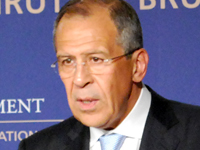Registration
You will receive an email confirming your registration.
U.S.-Russian relations are becoming more pragmatic and business-like, reflecting the personalities of Presidents Obama and Medvedev. But signals of goodwill, while welcome, must be translated into tangible achievements to undo the damage of the last twenty years, according to Sergey Lavrov, foreign minister of the Russian Federation. Missile defense in Europe, rapid NATO expansion, and the previous administration’s vocal disagreements with Russia over the August 2008 Georgia war challenged Russia’s security and must be addressed as the relationship moves forward.
But longstanding disagreements should not block progress on other vital issues. As President Obama prepares to visit Moscow in July, Lavrov outlined a common agenda for the United States and Russia. Jessica Mathews, president of the Carnegie Endowment, moderated the discussion.
Arms Control and Security
- Russia and the United States, with 90 percent of the world’s nuclear weapons, bear primary responsibility for reinvigorating the strained nonproliferation regime. They must make deeper cuts in their arsenals, reinforce IAEA safeguards, and encourage universal adoption of the Additional Protocol.
- The standoff over Iran’s nuclear program can only be resolved with a comprehensive solution that takes into account legitimate Iranian security and economic interests.
- Existing Euro-Atlantic security arrangements are insufficient. Lavrov echoed President Medvedev’s call for a unified, legal security framework that gives Europe, Russia, and the United States equal weight and in which all participants feel comfortable.
Lessons from the Soviet Occupation of Afghanistan
- The international coalition should place greater emphasis on social and economic development, and less on military force.
- A political solution must involve all of Afghanistan’s ethnic groups, and neighbors—each of whom has cultural ties to an Afghan ethnic group.
- Russia is willing to allow ISAF expanded access to the northern supply route to Afghanistan—including the transfer of troops and weapons. But Central Asian countries on the supply route must be included in transit agreements.
Economic Ties
- As part of an inevitable shift toward financial multipolarity, a system of regional reserve currencies should be established to act as pillars of the global financial system.
- The United States and Russia need a stronger and deeper economic relationship. Strengthening business-to-business ties will help rein in the tendency to play zero-sum politics.
- Russia, Europe, and Central Asian countries must renegotiate an energy agreement that establishes an early-warning mechanism for supply shortages or delivery cutoffs (as occurred in January) and removes barriers preventing Russian nuclear energy companies from competing in Europe.
“If we are serious about the need to reset our relations, then we must get rid of the toxic assets inherited from the last years,” Lavrov concluded, “otherwise we cannot successfully reinvigorate the U.S.-Russian dialogue, which, in view of the special responsibility of our two countries, is in the interest of the entire international community.”
